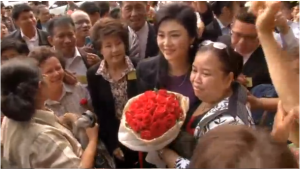
Former Thai Prime Minister Yingluck Shinawatra appeared in court on Friday (January 15) for the start of a lengthy corruption trial that critics say is an attempt by the ruling junta to further restrict the influence of her and her family.
Yingluck, whose government was ousted by the army in 2014, is the sister of ousted populist Prime Minister Thaksin Shinawatra, who was also deposed by the army in 2006 and remains the most divisive politician in modern Thai history.
Yingluck faces charges in the Supreme Court over her management of a rice scheme, a flagship election policy that helped sweep her to office in a landslide in 2011 but which critics say hemorrhaged billions of dollars.
She was banned from politics for five years in January 2015 after a military-appointed legislature found her guilty of mismanaging the scheme.
Yingluck faces up to a decade in jail if found guilty of criminal charges in the rice-subsidy case.
“There may be testimonials that are out of the context that the plaintiff gave to the NACC (National Anti-Corruption Committee) and there will be witnesses who never appeared before the NACC,” Yingluck told reporters outside the court.
Prosecutors in the case are expected to present four witnesses on Friday. The trial is expected to last until late 2016, with the final defence testimony slated for November.
The military government says the rice scheme was riddled with graft and incurred billions of dollars in losses and distorted global prices that saw Thailand lose its crown as the world’s number one exporter of the grain to India in 2014.
Thailand’s decade of political conflict broadly pits a Bangkok-based middle class and royalist elite, backed by parts of the military and judiciary, against voters from the north and northeast loyal to Yingluck and Thaksin.
Yingluck was greeted by more than one hundred supporters as she entered the court amid heavy security.
Some shouted “The prime minister of the people! You must fight!” Others shouted “We love Yingluck!”
The scheme, which bought rice at above-market prices from farmers, left Thailand with millions of tonnes in stockpiles which the government is still trying to shift.
Some of the rice is rotten because of poor storage. The military government last year said it would sell some 6 million tonnes of rotten rice in 2016 to the industrial sector.
Yingluck has defended the scheme. In a letter sent to junta leader Prayuth Chan-ocha in November she said that the attorney-general was deliberately rushing the case against her for political reasons. (Reuters)








